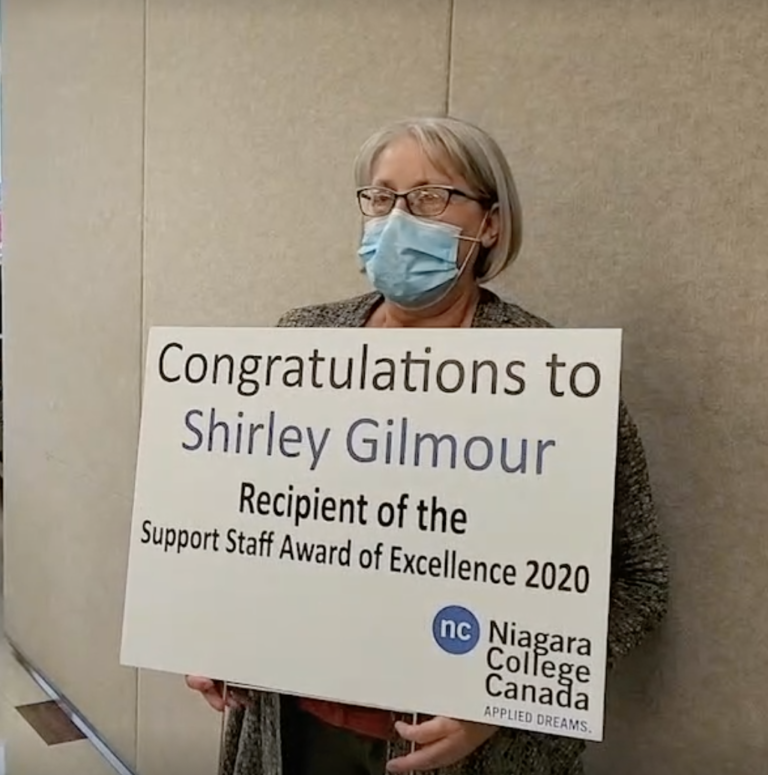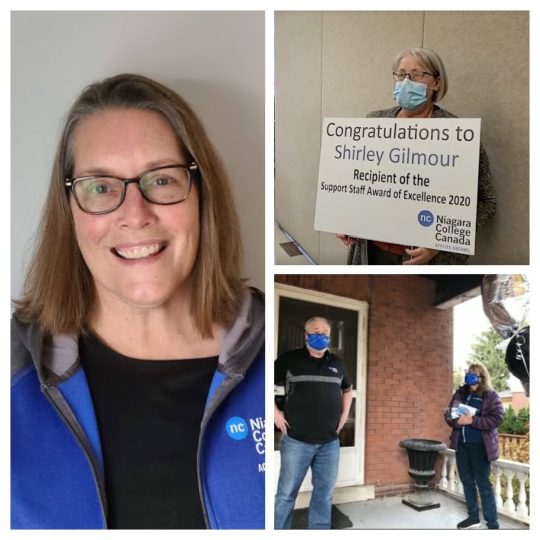Three members of the Niagara College team were honoured for their exceptional service and accomplishments with 2020 Awards of Excellence.
We caught up with our latest recipients to talk about their achievements:

Christine Wilkinson, Coordinator, Recreation Therapy Program, Faculty Award of Excellence
I’ve been teaching full-time in the college system since the mid-1990s with most of that time at Niagara College. I’ve stayed very connected to the field by serving on the Board of Directors for Therapeutic Recreation Ontario for many years, and recently co-chaired their annual provincial conference with fellow NC faculty member Jackie Frail. Although recreation therapy professionals work across many settings, my real passion has been the long-term care sector and specifically finding ways to bring meaning and purpose to the lives of those living with dementia. I became a Virtual Dementia Tour trainer several years ago, and also a DementiAbility Methods trainer. I’ve really enjoyed embedding these experiences into the RT curriculum to set our students up to effectively meet the needs of those living with dementia.
How does it feel to be recognized by your peers with this award?
I love watching the Award of Excellence presentations every year, and I always cry, even if I don’t know the recipient! It’s a pretty incredible feeling to have heard my name called this year (and yes, I cried). And the way this was pulled off with the live presentation during the virtual Niagara Day was so creative and well done. I am deeply appreciative to those who were part of the nomination and selection process. I truly feel so grateful every day to work alongside the other incredible members of the Recreation Therapy team, and to have the unwavering support from Associate Dean Carol Phillips and Dean Carolyn Triemstra, who (almost) always say ‘yes’ when I come to them with an idea I want to try in the Recreation Therapy program.
What’s the most rewarding part of working at Niagara College?
There are so many things about my job at Niagara College that I love. If I had to choose one thing, it’s seeing the growth in our students’ knowledge, skills and confidence from when they start the program until they graduate. Having the opportunity to collaborate with many of our grads after they finish the program is so rewarding. They come into our classes as guest speakers, they supervise our students on placement, they partner with us on applied projects and serve as great ambassadors for the program. The pride I feel in seeing the passionate, creative and enthusiastic recreation therapy professionals they have become is hard to describe. It makes me emotional when I learn of their accomplishments and see how they make such a huge difference in the quality of life for the people they support.
What’s your secret to connecting with students and keeping things interesting in the classroom at this time of virtual learning?
To start, I have to say that I really miss being face-to-face with students. Supporting students, both in and out of class, has always been one of the most enjoyable parts of my job. Having to shift to being fully online definitely led to lots of change and uncertainties for everyone, but I’ve also found it very motivating to come up with new creative ways to share information and meet with students, and I looked for new practical opportunities with external partners. I think the best new project that I developed this fall involved second-year students running virtual programs on Zoom for long-term care residents.
I partnered with an organization called Art Your Service, which was working on the idea of creating a long-term care stream of virtual programs. After presenting a program proposal to me, the students did a couple of trial runs by recording their programs for review, feedback, and revision. The owner of Art Your Service and I then selected the top five programs to be delivered live to long-term care homes across the region and beyond. We described it as being like Canadian Idol and they were auditioning to make it to the live show. Students rose to the challenge and there were some really creative programs like a virtual campfire singalong, music trivia reminiscence, and Happy Holidance. Watching my students on the screen and seeing so many long-term care residents from multiple homes smiling and participating along with them melted my heart, especially given all of the current restrictions in place. The feedback from the students about this project was so positive, and this was definitely a highlight of the semester for me as well.
How do you start every day?
I’m an early riser and am typically up at least an hour before anyone else in my household. It’s one of my favourite times of the day, to be honest. I make myself a coffee and take advantage of the quiet to return emails that came in overnight and make my work to-do list for the day. That allows me to have a clear idea of what lies ahead for the day and get right down to work once the kids have left for school.

Shirley Gilmour, Assistant to the Associate Dean, Academic and Liberal Studies, Support Staff Award of Excellence
I have been with the College for over 20 years; 15 years full time. I would have to say my greatest accomplishment was graduating with my three-year Advanced Human Resources Diploma and graduating from the Advanced French Certificate program, both at Niagara College. They have both been longtime goals for me. I am a firm believer in life-long learning.
How does it feel to be recognized by your peers with this award?
I am truly grateful for the people I work with. I’ve built true friendships throughout my years. I was humbled by the kind words conveyed in the nomination letters, particularly regarding how appreciative they are of my caring nature.
What’s the most rewarding part of working at Niagara College?
Connecting with the students and watching them grow as individuals while fulfilling their dreams. I love seeing people succeed in their goals whether it be students or my colleagues.
What’s your one must-do for a great day at the office?
Well, besides coffee, humour and personal connections with the people I work with are important to me.
Any advice for someone just starting their career at the College?
Learn as much as you can about the broader college community, not just in your division, so you can better serve our students and the rest of your colleagues.

James Butko, Associate Dean of Liberal Studies, Administration Award of Excellence
Currently, I am the Associate Dean of Liberal Studies at the Welland Campus. Previously, I was in the School of Business, first as a professor of Economics, Finance and Accounting and then as the Associate Dean. I started in the fall of 2000 and recently celebrated my 20th anniversary with the College.
One of the things I wasn’t anticipating when I came on board was the opportunity for international travel on behalf of the college. As a professor, I was given the opportunity to teach in China in the spring of three consecutive years. I returned to China as an administrator and in that capacity also visited the Caribbean and Denmark. This helped me recognize the transformational aspect of international travel both for staff and students.
The other personal highlight has been seeing the career success of my own children because of their NC studies. Of the four who have graduated from Niagara, three graduated university before graduating NC, but in their current positions, it’s the skills and knowledge they gained at NC that have been most useful. I’m confident that my two remaining children, who hope to graduate this spring, will be equally prepared for the workforce.
How does it feel to be recognized by your peers with this award?
While the award is nice, the best feeling came when I was able to read the nomination itself. Faculty, staff and students whom I hold in high regard, had some very nice things to say. As Associate Dean, the most important part of my job is to remove obstacles so the process of teaching and learning takes place as successfully as possible, and based on what I read, it seems like I have been somewhat successful.
What’s the most rewarding part of working at Niagara College?
Before coming to Niagara, I taught in the Business program at Brock. I enjoyed it and had some really great students but I’m not sure we, as university professors, had the opportunity to change students’ lives the way we do in college. My favourite movie has always been It’s a Wonderful Life and I really believe that we in the college system would be amazed to see the change in the world if we had not been here to have the thousands of small — and the few large — interactions with so many students over the years. I specifically recall a student, who had come to me with some serious issues, and she wasn’t completely satisfied with my intervention at the time. As she walked across the stage at convocation, she detoured slightly on her way to Dan and whispered ‘Thank you’ to me. It choked me up then and still does today. I really believe that those occasions where a student acknowledges our role in their success are the tip of the iceberg of all the students whose lives we have helped to change for the better.
What’s your key to leading successfully, especially during these challenging times?
I try to be authentic. I am, at heart, an economist and I try to be rational and logical. In any situation, I try to get as much information as possible to support my position and I try to honestly explain why a particular action is being taken. I think I gravitated to teaching because I liked being right and as the professor, I got to make the answer key, so I was. Upon becoming an Associate Dean, the faculty was very helpful in pointing out the many occasions when I wasn’t right. This was very uncomfortable at first, and still is, but I think it’s appreciated that I’m not so invested in any decision that I’m unwilling to deviate to that different course of action if presented with a better option. And then take credit for it. (Laughs.)
How do you start every day?
I start my day the previous evening by printing out my schedule for the next day. The job is a series of deadlines, loadings, budgets, work rotations, etc. When a deadline is approaching, that becomes the focus. In between deadlines is the planning and reflection piece of the job — analyzing how to do things better or more efficiently and determining what information is required to make better decisions or help faculty make better decisions.
With so much email these days, I do try and keep on top of it and make sure students, faculty, support staff and administrators get an answer from me as quickly as possible. Each morning, I write down the time and the number of emails I have to deal with, and at various times in the day, I repeat the process. On a good day, that number is significantly smaller at the end of the day than it was at the beginning.



